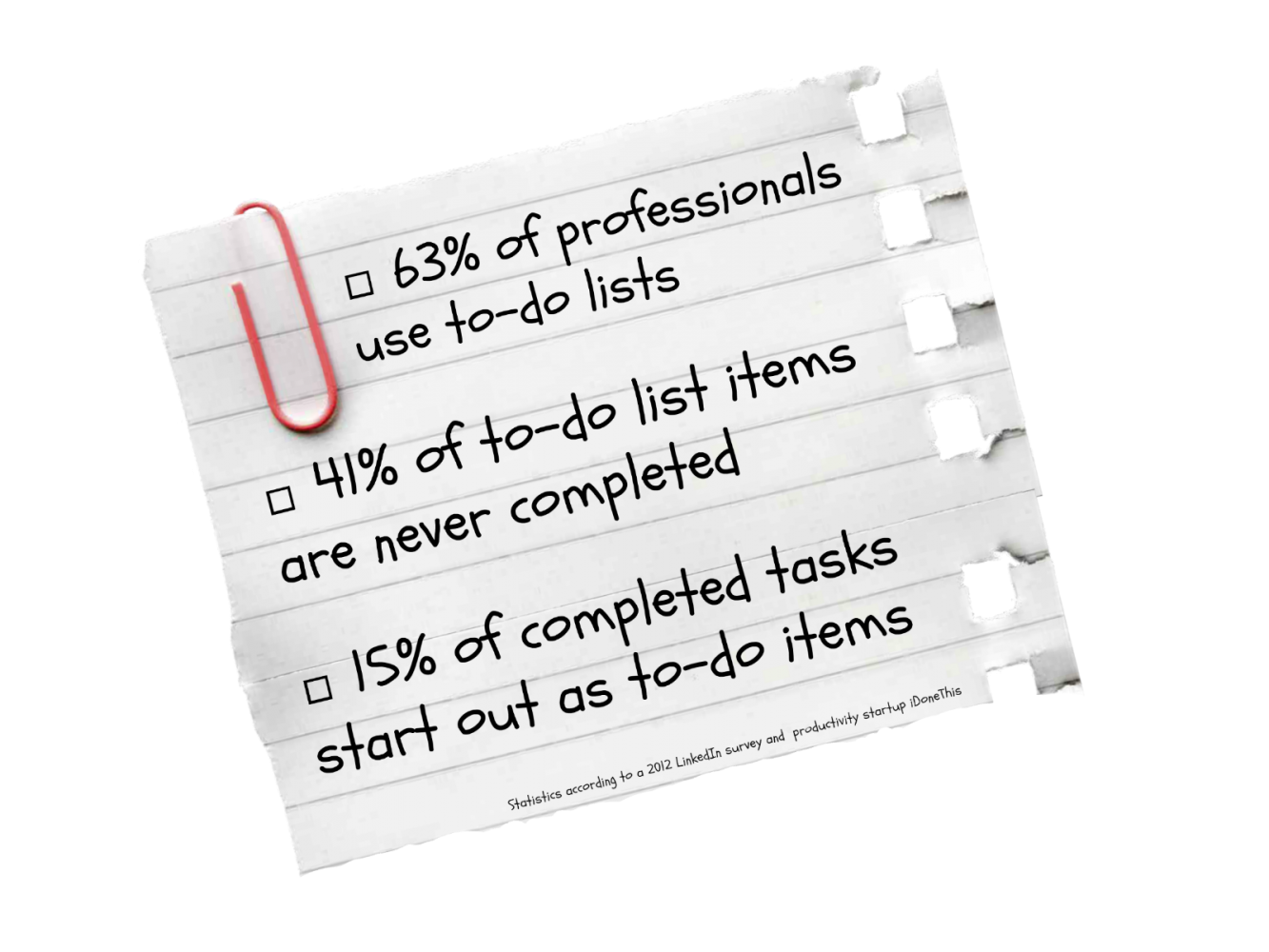Productivity: to-do list, or not to-do list?
September 7, 2017
Chemistry homework, check. English essay, check. De-stress and relax—not quite.
In the bustling whirlwind of academic commitments and extracurriculars, a to-do list seems indispensable. A survey conducted by LinkedIn found that 63 percent of professionals use to-do lists. How else are you supposed to remember to finish that history project and study for the math test next week? Not only does a list remind you of unfinished assignments, it also wards off any temptation to procrastinate by concentrating your focus on the tasks at hand, and at the end of a long day, the feeling of checking something off a list is satisfying beyond words.
However, the very perks and benefits of a to-do list can also be agents of stress. A study conducted by psychologist Bluma Zeigarnik demonstrated that we are 90 percent more likely to dwell over the tasks we have not completed than we are over the tasks we have completed, which leads to persistent feelings of unfulfillment and anxiety. Seeing a list of all the unfinished tasks in front of us only intensifies those feelings.
There is also value in unstructured thoughts and spontaneity, which a to-do list cannot provide. While spur of the moment impulses appear to be a hindrance to productivity, some of the greatest discoveries and works of art were products of time spent in leisure. If Newton had always been rushing to finish a list of errands, would he have had time to watch an apple fall from a tree and develop his theory of gravity?
That is not to say that to-do lists are not conducive to productivity. Without them, it would be too easy to forget to finish that history project and study for the math test next week. But as Zeigarnik’s research suggests, overreliance on to-do lists can lead to stress. The secret to effective time-management lies in the delicate balance in between.
In this case, the balance lies in how much you trust yourself to remember everything that you need to do. Try to avoid looking through the list after you make it, then see how many of the tasks you complete by yourself by making a “done” list at the end of the day. Not only will you develop time-management skills, you will also avoid the stress and anxiety that comes with overusing a to-do list, and eventually, you might find time to check off “de-stress and relax.”


















![“[Building nerf blasters] became this outlet of creativity for me that hasn't been matched by anything else. The process [of] making a build complete to your desire is such a painstakingly difficult process, but I've had to learn from [the skills needed from] soldering to proper painting. There's so many different options for everything, if you think about it, it exists. The best part is [that] if it doesn't exist, you can build it yourself," Ishaan Parate said.](https://harkeraquila.com/wp-content/uploads/2022/08/DSC_8149-900x604.jpg)




![“When I came into high school, I was ready to be a follower. But DECA was a game changer for me. It helped me overcome my fear of public speaking, and it's played such a major role in who I've become today. To be able to successfully lead a chapter of 150 students, an officer team and be one of the upperclassmen I once really admired is something I'm [really] proud of,” Anvitha Tummala ('21) said.](https://harkeraquila.com/wp-content/uploads/2021/07/Screen-Shot-2021-07-25-at-9.50.05-AM-900x594.png)







![“I think getting up in the morning and having a sense of purpose [is exciting]. I think without a certain amount of drive, life is kind of obsolete and mundane, and I think having that every single day is what makes each day unique and kind of makes life exciting,” Neymika Jain (12) said.](https://harkeraquila.com/wp-content/uploads/2017/06/Screen-Shot-2017-06-03-at-4.54.16-PM.png)








![“My slogan is ‘slow feet, don’t eat, and I’m hungry.’ You need to run fast to get where you are–you aren't going to get those championships if you aren't fast,” Angel Cervantes (12) said. “I want to do well in school on my tests and in track and win championships for my team. I live by that, [and] I can do that anywhere: in the classroom or on the field.”](https://harkeraquila.com/wp-content/uploads/2018/06/DSC5146-900x601.jpg)
![“[Volleyball has] taught me how to fall correctly, and another thing it taught is that you don’t have to be the best at something to be good at it. If you just hit the ball in a smart way, then it still scores points and you’re good at it. You could be a background player and still make a much bigger impact on the team than you would think,” Anya Gert (’20) said.](https://harkeraquila.com/wp-content/uploads/2020/06/AnnaGert_JinTuan_HoHPhotoEdited-600x900.jpeg)

![“I'm not nearly there yet, but [my confidence has] definitely been getting better since I was pretty shy and timid coming into Harker my freshman year. I know that there's a lot of people that are really confident in what they do, and I really admire them. Everyone's so driven and that has really pushed me to kind of try to find my own place in high school and be more confident,” Alyssa Huang (’20) said.](https://harkeraquila.com/wp-content/uploads/2020/06/AlyssaHuang_EmilyChen_HoHPhoto-900x749.jpeg)











